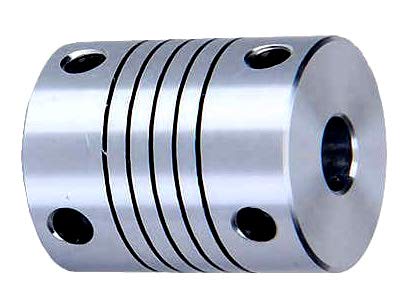In the intricate realm of industrial machinery, safeguarding vital components for durability and optimal functionality is paramount. Amidst the intricate dance of mechanical forces and dynamic environments, machinery contends with substantial stress, risking wear, reduced efficiency, and costly downtime.
Hence, the role of flexible shaft couplings as guardians against damage cannot be overstated. These unassuming components play a pivotal role in preserving the integrity of expensive machinery components by mitigating the detrimental effects of misalignments and shock loads. Delve into the multifaceted ways in which flexible shaft couplings function as essential safeguards, ensuring smooth operations and extending the lifespan of critical machinery components.
Protective Mechanisms of Flexible Shaft Couplings for Machinery
Flexible shaft couplings use protective mechanisms to ensure smooth machinery operation and safeguard components from damage. These mechanisms mitigate the impact of misalignment, shocks, vibrations, and dynamic forces. Common protective mechanisms include:
Misalignment Compensation
Flexible couplings excel at accommodating misalignments that inevitably arise in machinery systems. Whether due to manufacturing imperfections, thermal expansion, or other factors, misalignments can lead to stress on shafts, bearings, and components. These allow for controlled deflection and movement, distributing these stresses and preventing premature wear and damage. This capacity to handle angular and axial misalignment reduces maintenance requirements and promotes smoother machinery operation.
Elastomeric Elements
Many of these incorporate elastomeric components like rubber or urethane inserts. These elements function as vibration and shock absorbers, effectively damping vibrations and attenuating sudden impacts. By absorbing these forces, elastomeric elements shield machinery components from potentially damaging vibrations and extend their lifespan. This feature is particularly beneficial in machinery exposed to dynamic and unpredictable operational conditions.
Torsional Damping
Some of these products are designed with torsional damping mechanisms. These mechanisms absorb and dissipate torsional vibrations and oscillations that can propagate through the drivetrain. By mitigating these vibrations, the coupling helps prevent resonance-related issues that could compromise machinery performance. Torsional damping also reduces components’ stress and creates a smoother operational experience.
Torque Limiters
In scenarios where machinery encounters fluctuating torque loads, these may incorporate torque limiters. These limiters ensure the coupling disengages temporarily when the torque exceeds a predefined threshold. By preventing the transmission of excessive torque, these devices safeguard the machinery from sudden surges that could lead to damage or operational disruptions.
Shear Pins and Slip Clutches
These products can be equipped with shear pins or slip clutches to provide controlled disengagement when torque surpasses predetermined levels. Shear pins are designed to break under excessive torque, while slip clutches allow controlled slippage. Both mechanisms protect machinery from overloads and shocks, preventing abrupt damage and downtime.
Fail-Safe Designs
Some couplings feature fail-safe designs that ensure safe operation, even in the presence of component failure. This prevents catastrophic consequences and provides an additional layer of protection for both the machinery and personnel.
Resilient Materials and Environmental Protection
These made from resilient materials, such as elastomers, composite materials, or flexible metal alloys, effectively absorb shocks and vibrations. Couplings tailored for specific environments also incorporate protective coatings or materials to resist corrosion, wear, and degradation, ensuring consistent performance over time.
Temperature Resistance and Easy Disassembly
Specialized couplings brands created by coupling manufacturers are engineered to withstand high operating temperatures and prevent premature failure due to thermal stresses. Furthermore, many couplings are designed for easy disassembly and maintenance, facilitating regular inspection, lubrication, and component replacement without requiring extensive system disassembly.
Why Machinery has to be protected from Damage with Shaft Couplings
Incorporating shaft couplings with protective mechanisms is a proactive approach to ensure machinery reliability, minimize operational risks, and maintain a safe and efficient working environment. Machinery needs protection from damage for eleven crucial reasons below, and shaft couplings play a significant role in providing this protection:
- Operational Continuity
Machinery damage can lead to costly downtime, production halts, and disruptions in critical processes. Shaft couplings types with protective features help prevent sudden failures, ensuring continuous and uninterrupted operation.
- Reduced Maintenance Costs
Repairing or replacing damaged machinery components can be expensive and time-consuming. Protective couplings minimize wear and tear, reducing the frequency of maintenance and the associated costs.
- Extended Equipment Lifespan
Machinery subjected to excessive forces, vibrations, or misalignment is more likely to experience premature wear and failure. These products that mitigate these factors contribute to the longevity of equipment, optimizing the return on investment.
- Enhanced Efficiency
Damaged machinery often needs to be more efficient, consuming more energy or producing subpar results. Protective couplings maintain optimal performance, promoting energy efficiency and overall productivity.
- Safety of Personnel
Malfunctioning machinery can pose safety risks to operators and maintenance personnel. These reliable products prevent sudden equipment failures that could harm individuals working in close proximity.
- Prevention of Secondary Damage
Machinery failures can trigger cascading effects, damaging interconnected systems or nearby equipment. These products help contain the impact of any failures, preventing widespread damage.
- Cost-Effective Solutions
Compared to the costs of repairing or replacing damaged equipment, investing in high-quality couplings brands is a relatively cost-effective way to ensure machinery durability and reliability.
- Consistency in Output Quality
Machinery damage can lead to product quality and consistency variations. These products maintain stable operations, resulting in consistent output quality.
- Risk Mitigation
Machinery damage can lead to legal liabilities, compliance issues, and reputational damage. By using these types of products, businesses can mitigate these risks and maintain regulatory compliance.
- Operational Predictability
With protective couplings, machinery operators can have greater confidence in the equipment’s behavior, allowing for more accurate planning and scheduling of maintenance activities.
- Optimized Performance
Machinery maintained in good condition performs at its best, achieving the intended performance levels and meeting production targets effectively.
Essential Considerations for Selecting Shaft Couplings to Safeguard Machinery from Damage
Several essential factors must be considered to ensure optimal performance and safeguarding when purchasing shaft couplings to protect machinery from damage. These factors include:
- Load Capacity and Torque Rating
Ensure that the chosen shaft coupling can handle your machinery’s expected loads and torques. Oversized or undersized couplings can lead to premature wear and potential damage.
- Misalignment Tolerance
Different types of machinery may experience misalignment during operation. Select shaft couplings with appropriate misalignment tolerance to accommodate any misalignment without causing excessive stress on the components.
- Type of Coupling
There are various types of shaft couplings available, such as flexible, rigid, elastomeric, and more. Choose the type that best suits your machinery’s requirements and the level of protection needed.
- Vibration Damping
If your machinery generates vibrations, consider couplings with vibration-damping properties to prevent the transfer of excessive vibration to the connected equipment, which can lead to wear and damage.
- Environmental Conditions
Take into account the operating environment, including temperature, humidity, and exposure to chemicals or contaminants. Some couplings are better suited for specific environmental conditions.
- Maintenance Requirements
Consider the ease of maintenance and potential downtime associated with the chosen coupling. Couplings that require frequent maintenance impact overall machinery reliability.
- Material and Construction
The material of the coupling should be durable and resistant to wear, corrosion, and fatigue. Stainless steel, alloy steel, and other high-strength materials are often used for reliable couplings.
- Shaft Connection Type
Ensure compatibility between the coupling’s connection type (keyed, clamped, etc.) and the shafts of your machinery to prevent any issues during installation and operation.
- Overload Protection
Some advanced couplings offer overload protection features that can help prevent damage during sudden spikes in loads or torque, enhancing the overall machinery protection.
- Ease of Installation
Choose couplings that are easy to install or come with clear installation instructions. Proper installation reduces the risk of damage due to errors.
- Cost and Budget
Balance your machinery’s protection needs with your budget constraints. While high-quality couplings may come at a higher cost, they can offer better protection and longer service life.
- Compatibility
Ensure that the chosen coupling is compatible with your machinery’s existing components and systems to avoid compatibility issues and potential damage.
- Manufacturer Reputation
Opt for shaft couplings from reputable manufacturers known for producing reliable and high-quality products. Research customer reviews and industry feedback to gauge their performance.
- Consultation with Experts
If unsure, consider consulting with engineers, manufacturers, or specialists familiar with your machinery type to get expert advice on the most suitable coupling for your protection needs.
Unveiling the Power of Flexible Shaft Couplings With Misumi
In the intricate realm of industrial machinery, flexible shaft couplings serve as essential safeguards, countering mechanical stresses and dynamic environments through misalignment accommodation, vibration dampening, and integrated protection. Their contribution to equipment longevity, operational continuity, and lowered maintenance expenses solidifies their role as critical guardians of machinery integrity, enhancing overall effectiveness and reliability in workplaces.
Elevate machinery performance with MISUMI’s precision-engineered shaft couplings. Our diverse top-tier range redefines efficiency and durability. Discover tailored, customizable solutions at https://th.misumi-ec.com. Enhance workplace safety and efficiency by investing in our shock absorbers, which are vital for a secure, productive, and sustainable industrial workspace. As operations evolve, the significance of shock absorbers remains steadfast. Join us in revolutionizing industries through innovation and unwavering quality commitment. Invest in steadfast performance.





